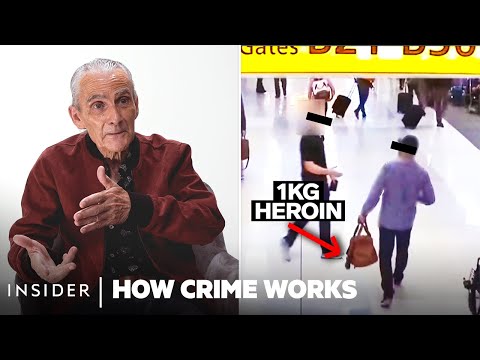How Heroin Trafficking Actually Works | How Crime Works | Insider

My name is David McMillan. I've smuggled over $17 million worth of heroin internationally. And this is how crime works. The heroin world is very dark and full of secrets. Involves hundreds of thousands of people, mostly down at a very low level.
And you're passing by heroin traffickers without even thinking about it. I was a smuggler for over 35 years. Been arrested around about 12 times. All of my knowledge is through my own experience. The three main producers around the world of heroin have become Mexico, mostly to serve the market in the United States.
In South Asia, it's Vietnam and Laos, the remnants of the old Golden Triangle. And, of course, Afghanistan, which tops all of them in sheer volume. And that comes from different provinces which over the years have had sometimes droughts and sometimes interference. The Taliban actually stopped almost all of the heroin production. But they changed their mind when they saw the money.
One of my first trips to Afghanistan was back in '79. When finding and making a reliable contact for heroin, it's best not relied upon through introduction. Because the person who's introduced you, he could be an agent for the DEA. So it's better to go from the ground up. And that might mean going out to the farmlands, meeting the farmers. I've traveled out into the heartlands of Afghanistan and lived with the farmers for a few days, perhaps a week.
Got involved in something local. Helped with a well. Come to know something about their lives. And they make their own judgments.
People in the village would come to trust me because I wasn't in a hurry. You don't need an awful lot of opium to do quite well if you're a farmer. They get at least $50 a kilo.
Now, for a farmer, that's quite good. The opium poppy has a big bulb underneath it, and that's about the size of a golf ball. The farmers, when it's mature, scrape the sides of it, and overnight, little beads of white sap are produced. That's scraped off to form a kind of sticky brick.
Now, that is the opium base. That contains a very, very high yield of morphine, 15%, 20% sometimes. Beyond the farmers, every part of the heroin cultivation, processing, and handling is done separately. None of the people connected with the supply side are really connected in any group way that you might expect with crime.
They are simple people in the countryside. You would buy perhaps, say, 10 kilos of opium base. We'll call them chemists, but they're really just, like, skilled artisans who would take that and do the processing. Now, don't imagine some fancy laboratory or anything when it comes to that.
You'll see a couple of old tin pots, five or six plastic buckets, some cloth for filtering, some drums of chemicals. Oh, and maybe an old branch for stirring things. The opium base is washed out to extract that morphine, dried out into kind of a black gunk, and then it is cooked with acetic anhydride. It smells like a really incredibly strong vinegar. The rest is cleanup, because it first comes out of that completely brown.
There are really only two types, white and brown. The brown is the half-processed and only half-as-strong version. The white has been purified, cleaned. The brown is smoked, whereas the white has traditionally been injected or snorted. But there's been almost no white heroin sold around Europe for years. And people who inject have been injecting brown heroin.
A dangerous thing to do, and a corrosive thing to do on their own arteries and veins. The police agencies have their own way of determining the purity of heroin. There really is no better test than experience, and I can tell within seconds from the smell, the texture, and the taste of heroin where it came from and very close to how strong it is. I would first have to get it out of Afghanistan -- it's a landlocked country -- and shipped through to Pakistan.
That had its own complications across the border, because any kind of commerce there, whether it's smuggling or not, involves a certain amount of lubrication of the border area. Bribery. Everything has a price, whether it's refrigerators or television sets. The smuggling of heroin is limited by the fact that it can't really be disguised into looking like something else.
It can be packed flat into many different objects. In fact, books were often used. The hardback covers, front and back. I suppose I'd have to look back upon my time smuggling out of Thailand as the most successful operation. The quality was right. It was the big bags that come from the Golden Triangle where they're in plastic, and they're stamped with the brand name of the local warlord or chieftain who guarantees safe passage.
I would press it down and conceal it within the wooden surrounds of radio amplifiers or a piece of electrical equipment in your in-hold baggage without it being interfered with. I would make it pressed within the sides of the wood and veneered around the outside. Almost all of the heroin that's transported by air very rarely goes above half-kilo slabs that get concealed in luggage or body-packed or even made into the handles of suitcases.
I used to carry it around by myself, you know. But at least I knew if I did it myself, I'd be in control of my own destiny. But I relented. I found couriers. Couriers were chosen by their look -- that had to pass the first test -- their stability and reliability, and also their ability to keep quiet after the event. And that was very important. I had one guy that was a kind of recruiter for me down in Pattaya, and another one in London.
My recruiter in London had been kicked out of Southeast Asia. Ended up at a hostel here that the government used to try and resettle people who'd been kicked out of other countries. It was a gold mine of couriers. Somebody who's not relaxed and operating out of their own volition makes a very poor courier.
I don't think people always have completely selfish motives. People who have families to support sometimes consider it. Poverty might make that final little push.
To pass through airport security, it was important to know the airport systems very well. I would spend quite a bit of time traveling through those airports, knowing what kind of X-ray machines they used, what the staff were trained to do, whether shoes had to come off or not, how sensitive the metal detectors were. As years went on, customs teams would be trained particularly well in detecting certain kinds of things. They have some for cigarettes. They have some for drugs. They would move those teams around at different times of the day.
It was important to know when that team was on. I would use multiple passports in ensuring the safety of the couriers, so that when they left a source country, they would arrive in Europe and be able to take out of their pocket another passport which showed only travel in Europe. And they would have tickets to match. I got birth certificates for people who had died either in infancy or very young, pre-traveling age and then built up the identity around that and get them legitimately issued.
Arriving passengers were told to go to some arranged point, perhaps a hotel in town or a restaurant. I would watch them to see if they'd had any problems, because it's always possible that they'd been intercepted. Then they would be paid off immediately, and the bags would be taken away. Then it would be put into storage for safety. I like to think of it sometimes as looking at one of those phone apps where it shows you all of the flights in the world that are going on.
You see thousands of them. And in a way, you can say that every one of those little planes has got somebody, maybe four or five people on board who are carrying some amount of heroin. During my smuggling criminal career, I've been arrested around about 12 times, and it resulted in four convictions. The first one, that was back in 1981 in Australia, resulted in a 10-year sentence. I'd been under an investigation by Australian police, and I was running couriers at the time.
My own lawyer had told me to get out of town, but I stuck around. "No, I can deal with that. They'll never catch me with anything." I was sentenced to 15 years, of which I would ultimately serve 10. There's no lawyer in the trial. Anything can go.
It seems everything's fair. I would say this: one of the reasons that I think the deterrent sentences don't work often, the super-harsh treatment. My wife at the time, Clelia, was arrested; my business partner's wife, Mary, was arrested; and they were put in the women's prison. They put an informer in with the girls in the women's prison to try and get some information out of them. Unfortunately, little Danielle was an arsonist. That's what she was in for.
She set fire to the prison, and five women were killed, including Clelia and Mary. That was a ... oh, I don't have to say, it was a major low point. I felt guilty, and so I should. The police had moved into my house and trashed it.
Every possession I had was gone. My wife was dead. After that, next came my time in Thailand, where I was arrested on a drug case and escaped from there. That took two years' doing to get out of that place. I found myself arrested in Pakistan, and that took almost two years, again, to get a not-guilty plea. From there, I found myself arrested in Copenhagen, and then, lastly, a little stretch in the UK. In my early 50s, around 2004, I walked away from the last deal.
I'd been giving bits of advice and being tipped for it, but even that was too close for comfort. I'd run out of time. I was getting simply too old. The price for this is jail time, and I'd promised family not to use anymore. And also, based on looking back and realizing that the reward was never enough.
When it comes to the larger amounts, then it's all by shipping. I've known people to take hundreds of kilos of heroin and pack them into oil drums or even in the pallets of other goods that are going. So, a technique would be to order some goods through an existing and reputable firm that had agents all around the world. Table lamps or even cab doors or cabinets, so that when it arrives back in the West that's being cleared as their cargo, not yours.
Sometimes, customs will intercept quite large shipments. People have asked me, "Would this make a dent in the market?" The supplies are built up at least three months in advance. So. Besides which, the intercepted cargo never amounts to the total flow going through. So those seizures, though they might make the news, a 10 lost here or even 5,000 kilos there won't substantially make any difference. The shipment routes for illegal and legal heroin never overlap. The approach is different, and the mechanism's entirely different.
After a shipment comes in, then it's unpacked, bagged up into whatever form it's going out, whether it's in bulk in kilos or smaller amounts, ounces. It gets taken out to customers. Within a month, all would be gone.
In the early days, it was so profitable. A kilo of heroin back in 1980, just personally, I could get back a million dollars from that. And this was in Australia, which has, of course, got inflated prices there. Expected purity was only at about 15%. So if I took it down to 18%, it would still be considered good.
I used only dextrose to do this. But that still meant 1 kilo became 4. In the beginning, even put in place a street network, because there were a couple of streets in Melbourne which were notorious for it.
Then come back to base four or five times a night and reload, as it were. There's been some changes between, say, 2002 and 2022. The retail price of heroin has dropped considerably. It's now at about its most base level. Purity's not great, but price-wise, I can't imagine any factors that would make it any cheaper or possibly take it up.
Is it more available? It is, but there is no market beyond a certain point. The popularity of heroin goes in waves of different fads and fashions. There's a solid core of people who are fully addicted, and they don't change much. Street-level heroin is, of course, not pure.
It would be dangerous if it were. It's usually at about 15% to 20%, and that's considered strong. The cutting agents for brown heroin, usually mannitol. It's really a baby laxative. In recent years, heroin's been cut with a drug called fentanyl. It's a synthetic opioid, but it's a very dangerous drug.
It's at least as strong as even heroin. So how would anybody measure it out? A tiny amount of fentanyl is often mixed with heroin to keep the strength up, but that can quite often be misjudged and end up with fatalities. But when there's a shortage or when somebody's simply greedy, the retailer can cut it again. And this can be potentially dangerous because it will seem weaker, and people will adjust to using weaker and they'll use more, so that when they get what used to be the standard batch, it'll be quite a bit stronger, and there's a potential for overdose. But it has to be kept in mind, very few people die directly from an overdose of heroin. It's usually when mixed with alcohol or sleeping pills.
It almost never happens when it's the heroin alone that finishes somebody off or takes them over the top. There were political elements to opium and heroin manufacturing and distribution. Until 1911, heroin and morphine were available from your local pharmacy or druggist, over the counter, just by asking for it. In fact, heroin was promoted as a kind of cure-all. Little heroin pills were made by Bayer in Germany.
But after 1911, the Harrison Act was passed in the United States, which turned attention to addictive drugs. When the Vietnam War took hold, heroin became something the US troops tried during their downtime. They took those habits home with them. So we have a legacy from the Vietnam War. It's called a war on drugs, but is it really a war? A war suggests that one side has got hopes of winning.
Drug traffickers and smugglers know that they won't win every break, but then again, they don't have to win to be successful. They've just got to keep out of jail most of the time. But still a high price to pay. From the authority's point of view, there would never be a situation where they could walk out and say, "Right, we've done our job. There is no more smuggling."
How can that possibly happen when the nature of business is ongoing, rolling, and it replaces the fallen soldiers? The authorities could catch more smugglers by acting on their intelligence or the tips they get, but they're kept by the amount of money, the resources they're given. In 40 years, I've only been taught one thing, that the only solution is to legalize all drugs. Legalization would require, of course, some control measures so that somebody wouldn't be going into a shop and without any sensible reason buying 10 kilos of heroin. On the other hand, to take away that black market, the control has to be very light.
And, of course, spend some money on offering services for people who can't manage their drugs. Different countries offer different but generally all poor alternatives to heroin and also not very effective treatment programs. In the United Kingdom, there's virtually none. Somebody reporting or presenting with a heroin addiction has to take a place on the list, and to get a substitute, has to wait several weeks. That will force them back into that world.
It might reduce the harm. It'll save them some money because they've got a fallback position of, say, taking methadone instead of using heroin. There are programs for harm reduction that are good, welcome, and have some effect, such as needle-exchange programs or offer safe places to take drugs. Of course, that doesn't get them off the drugs, but any of that assistance is all a good thing. There's very little that can be done, because you are hoping to make a consistent, standard product that won't risk overdoses, yet won't be so rubbishy that people will move on to unsafe supplies. But I don't see any way of doing that other than legalization.
Also, in a world of legal drugs, there'd be fewer prison inmates on minor or any drug charges at all. And that would have the effect of allowing more police time to be spent on violent crime and crimes that affect people in a more direct way. To help source countries, we would have to do more than simple crop substitution, which, so far, hasn't worked.
It's not much better than the deadly crop eradication, which has left a lot of farmers destitute. I was 18 years old when I first became involved in the drug trade and not much older when I began smuggling. I can never say in any way that I've ever been a victim of anything.
I've walked headfirst. Even as a teenager, I was up to some kind of mischief, selling bits of hash at school, whatever, from an early age. So when I met some safe crackers and they were retired from that, they were already a little bit in the local drug-distribution network with some local marijuana. But they didn't know anything about importing.
And it involved travel. I'd get to see the world, and it seemed good for me. And I went out and did it on purpose. Something we don't realize when we're young is that a regular human life is a short one. And you haven't got so many years.
Only looking back on the smuggling business, the drug trade, from an older man's perspective, how plain and clear it is that it is not just the danger, but it is the pointlessness and the futility of the undertaking. Since I've been out of the smuggling game, these days, I put up CCTV cameras, which involves a certain amount of trust. I've also written a couple of books, one that seemed to take years because it was involving that most complex world in Afghanistan and Pakistan and the troubles there and the involvement of the DEA. That took about 10 years to write. That's "Unforgiving Destiny." Of course, I regret kind of everything about the life I walked into.
People ask me why I didn't walk away from that world after my first major arrest. And the answer is that I couldn't imagine a world where I wasn't running around underground. It didn't seem to me at the time there was any real choice.
2022-09-29 04:18


